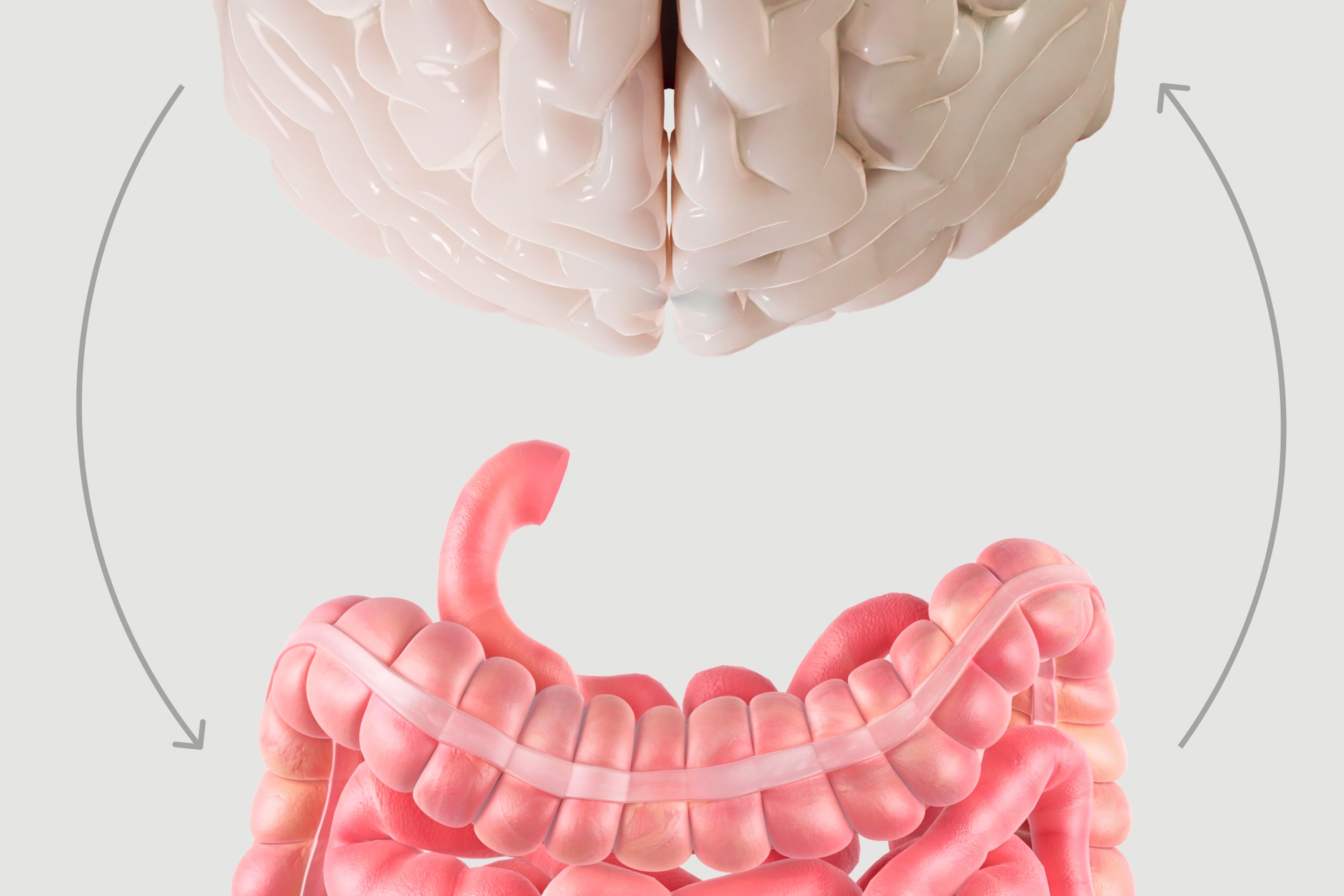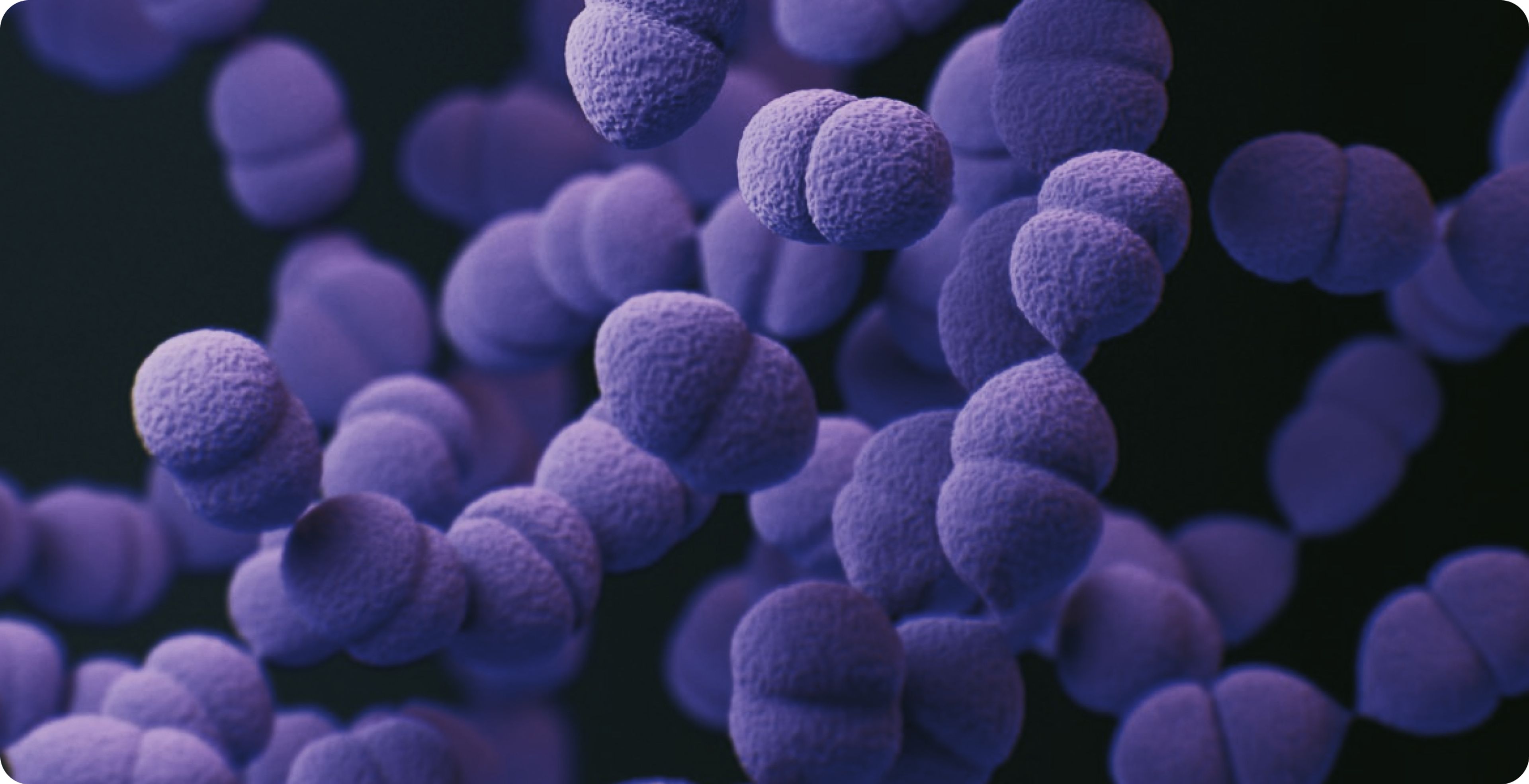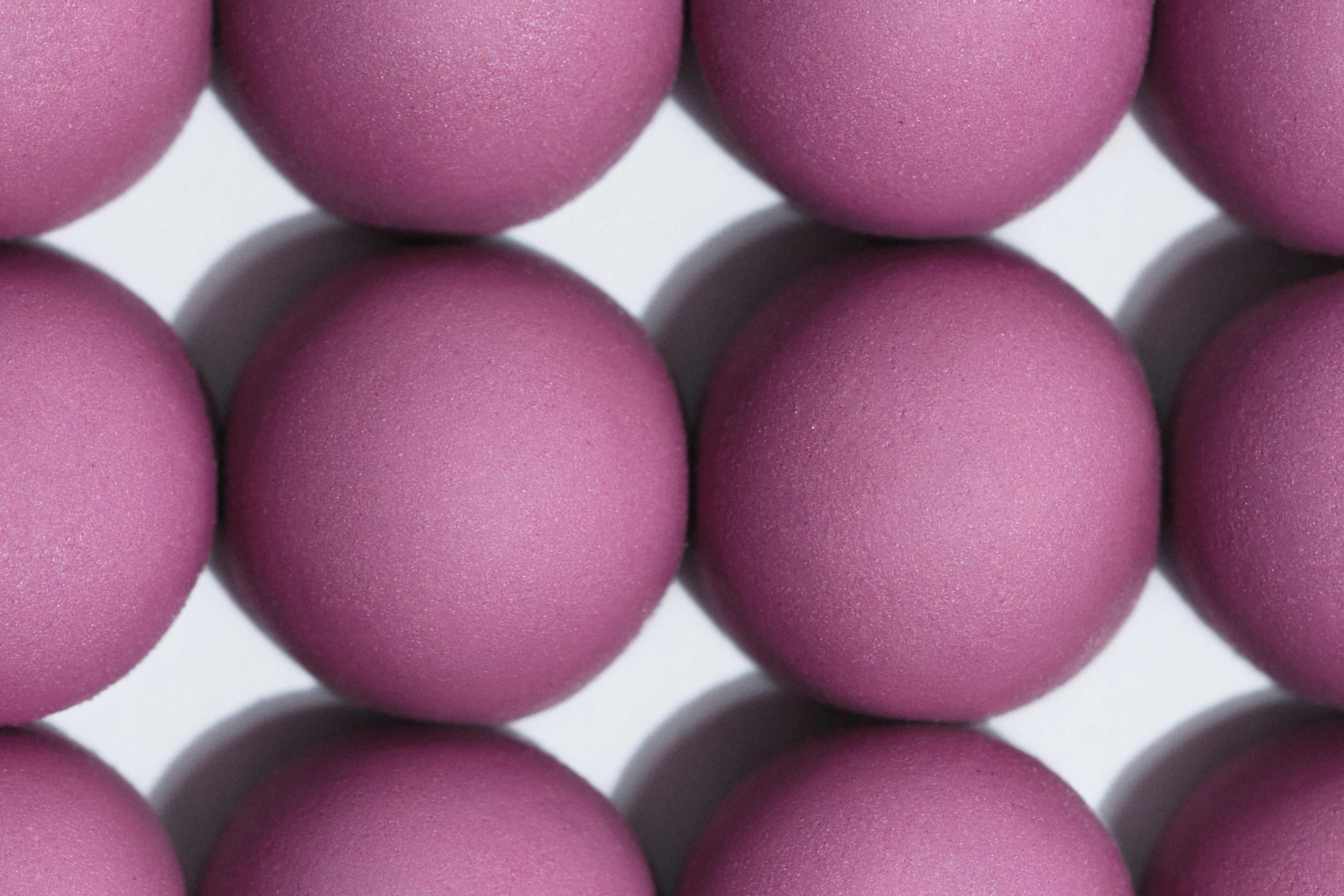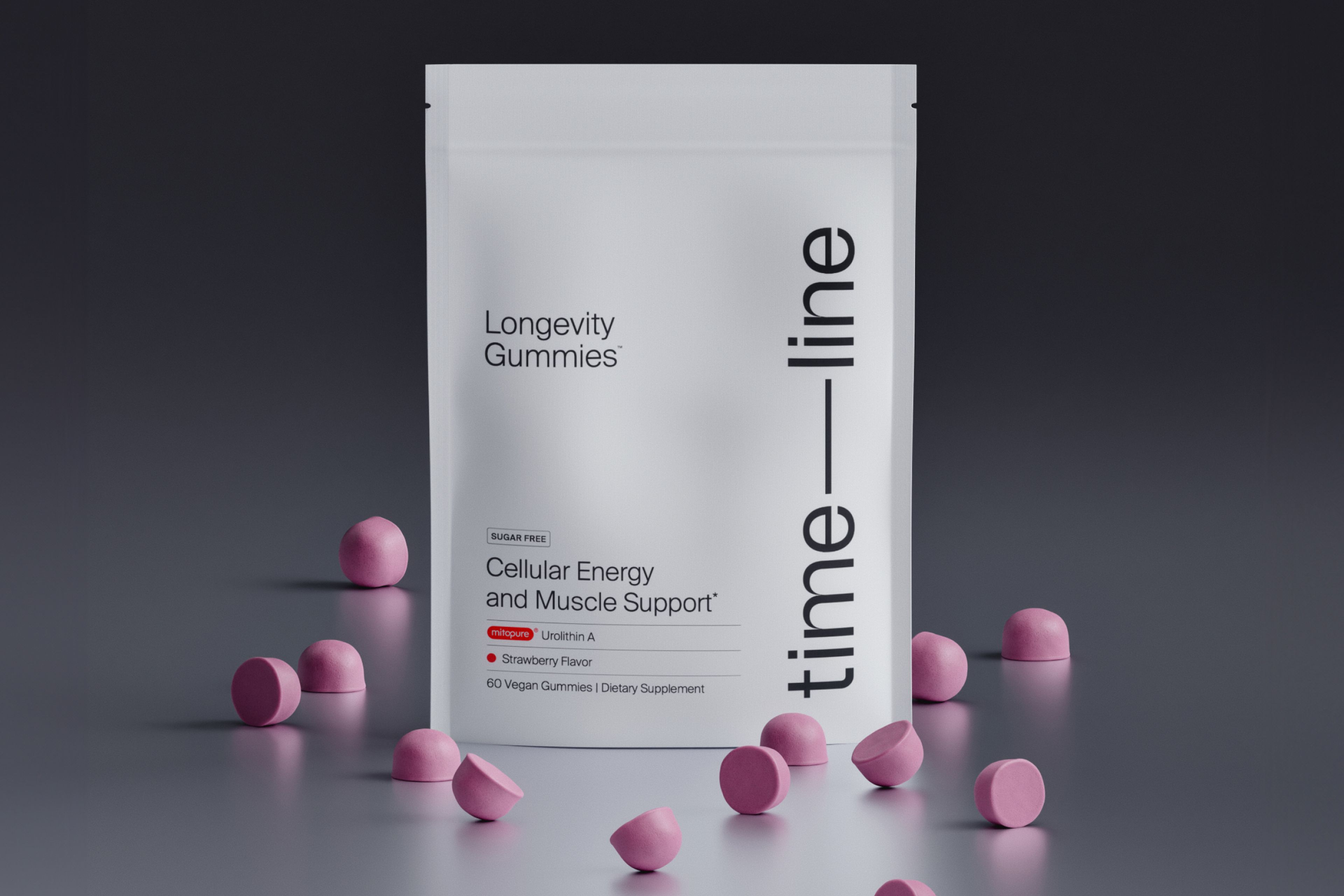Optimizing Your Brain Gut Connection for A Stronger Mind
The gut brain axis is the link between your gut and brain. Learn how gut health and brain health are intertwined and how to optimize this connection.

What to know
The gut-brain axis (GBA) is a complex communication network linking the gut and brain through nerves, hormones, and the immune system.
A balanced gut supports mood, mental clarity, and stress regulation, while an imbalanced gut is linked to anxiety, depression, and cognitive decline.
Probiotics (good bacteria), prebiotics (fiber and polyphenols that feeds them), and postbiotics (beneficial byproducts from probiotic digestion) work together to reduce inflammation and protect brain function.
Eating a variety of fiber-rich, plant-based foods and staying hydrated nourishes gut bacteria and supports brain performance.
Chronic stress disrupts the gut microbiome, but exercise, mindfulness, quality sleep, and outdoor time help maintain a healthy gut-brain connection.
The brain gut connection, also known as the gut brain axis (GBA), is a communication network between your digestive system and nervous system. The two systems talk to each other, with the vagus nerve, the largest cranial nerve, serving as the information superhighway between these two critical organs.
A balanced gut can optimize mood, support mental clarity, and reduce stress, while an imbalanced gut can contribute to anxiety, depression, and cognitive challenges. Likewise, poor mental health can negatively impact gut function, leading to digestive issues and microbiome imbalances.
Let’s explore the gut brain axis and how to strengthen it for whole-body health.
What is the Gut Brain Axis and How Does it Work?
The gut-brain axis is the connection between your gut and brain, allowing them to communicate and work together to keep your body in balance. This fascinating system employs a mix of nerves, hormones, and the immune system to send messages back and forth and enable the body to function at its best.[1]
The vagus nerve, which runs from the brain all the way down to the large intestine, plays a key role in transmitting signals between the digestive system and the brain. The gut brain axis influences things like digestion, mood, and stress levels, and when it’s disrupted can lead to issues like irritable bowel syndrome (IBS), anxiety, or depression.[2]
What’s more surprising is that dysbiosis has been linked to several health concerns far beyond the limits of the gut. This includes mental health issues such as anxiety and depression, skin conditions like eczema and acne, neurodegenerative disorders like Alzheimer’s and Parkinson’s disease,[3] and even metabolic conditions such as obesity and diabetes.[4] Emerging research continues to uncover the profound ways in which gut health influences overall well-being, reinforcing the importance of maintaining a balanced microbiome.

How Gut Health Impacts Brain Function
Gut microbes, the microscopic bacteria, viruses, and fungi that make up the gut microbiome, produce chemicals that can affect how your gut works. For example, friendly microbes can produce short-chain fatty acids (SCFA), one of several healthful compounds produced when gut bacteria ferment fiber in the colon.[5] These compounds are called postbiotics, as they are produced after probiotics (the “good bacteria”) ferment fiber in the colon (known as prebiotics).
The presence of SCFAs can positively affect the gut, and therefore, brain function. This helps explain how probiotics and brain health are intertwined.
One way they do this is by helping form the blood-brain barrier, an essential blockade that allows healthy substances into the brain but also keeps harmful ones out.[6]
Not all microbes in the gut are good. Harmful chemicals can be produced by certain gut microbes, which increase inflammation in the brain. One of these chemicals is called lipopolysaccharide (LPS). High levels of this toxin are associated with mental health and brain disorders such as depression, dementia, and schizophrenia.[7]
Widespread inflammation can also damage brain mitochondria, the energy powerhouses of the brain, increasing the risk of age-related cognitive decline.[8]
Inflammation and Mitochondrial Health
Interesting new research suggests that the mitochondria, the energy powerhouses in the body, play a role in gut health and inflammation.[10] Research demonstrates that damaged mitochondria may activate pathways that lead to inflammation, which can travel from the gut to the brain via the vagus nerve[9].
Fortunately, through lifestyle factors, we can target mitochondrial health and help to keep inflammation at bay.[11]
The good news is you may be able to reduce this inflammation by taking measures to support your gut health.

How to Improve the Gut Brain Axis?
Since your gut bacteria influence brain health, practicing diet and lifestyle habits to improve gut health is a smart strategy to support your brain. If you want to strengthen your gut brain axis, here are some key strategies:
A dynamic trio for gut health and brain health
Research demonstrates a gut health and brain health connection stemming from three core compounds: probiotics, prebiotics, and postbiotics. Let’s break them down.
Probiotics are perhaps the most well-known of the three types of “biotics.” They are the live microorganisms found in fermented foods and dietary supplements that help to maintain a healthy gut microbiome. But, they do not deliver their benefits in a silo. They need a little help from their friends, the prebiotics and postbiotics.
Prebiotics serve as nourishment for the beneficial probiotic bacteria in the gut, helping them thrive. These dietary components—such as fiber and specific polyphenols—cannot be digested by the human gut but instead, act as fuel for a healthy and balanced microbiome.
While prebiotics are certainly beneficial for gut health and, in turn, brain health, the byproducts of probiotic metabolism are just as essential. These metabolites are called postbiotics. Like the SCFA addressed above, new research is emerging into the unique benefits of other postbiotic nutrients in human health.[12]
Eat a variety of plants
Eating a variety of plant-based foods nourishes healthy gut bacteria, which is essential for producing beneficial compounds like SCFAs. A diverse gut microbiome supports better digestion, reduced inflammation, and improved gut barrier function, all of which enhance gut brain communication.[13]
Some of the best gut-supporting foods come from fiber and polyphenol-rich plants, which nourish the probiotic bacteria in the gut. Many experts recommend consuming up to 30 different plant foods per week for optimal gut diversity, which can be a mix of fruits, vegetables, beans, lentils, and nuts. While this sounds like a lot, you can easily rotate different options like pomegranates, leafy greens, black beans, navy beans, pistachios, and walnuts for variety.
Consume probiotic-rich foods
In addition to a diverse diet, enjoying more probiotic-rich foods and beverages can support both gut and brain health. They do this by increasing the number of healthy bacteria present in the gut. Good options to try include fermented foods and drinks like Greek yogurt, kimchi, kefir, tempeh, natto, miso, kombucha, and certain cheeses such as some forms of cheddar and feta that contain live bacterial cultures.[14]
You don’t have to consume all of these foods, but choosing one of your favorites on a daily basis can support the gut brain connection. If you aren’t able to eat these foods enough, you may consider a probiotic supplement.[15]Speak to your doctor or a gastroenterologist if this is the case, to determine which strains and dose may be best for you.
Feed your gut with prebiotics
Prebiotics are fibers and polyphenols that serve as nourishment for probiotics, helping them thrive. While we can't directly digest them, our gut microbiome can utilize them and produce postbiotics.
You can find prebiotics in plant-based foods like:
- Vegetables - garlic, onions, leeks, asparagus
- Fruits - bananas, apples, berries, pomegranate
- Whole grains - oats, barley, bran
- Legumes - chickpeas, lentils, kidney beans
- Nuts and seeds - almonds, pistachios, flaxseeds
In food products, terms indicating prebiotics are present, include inulin, pectin, and beta-glucans.
Don’t neglect postbiotics
While not found directly in food, postbiotics are produced as a byproduct of microbiome metabolism. Fibers and polyphenols serve as fuel for the good bacteria in our gut, which metabolizes these compounds and turns them into molecules that are beneficial to our health.
Eating a diet rich in prebiotics and probiotic foods helps your body naturally produce postbiotics.
Unfortunately, though, even with the most gut-friendly diet, some of us may never have the right gut microbiome to produce certain postbiotics. Taking postbiotics in supplement form will directly supply your body with these powerful nutrients.
Drink plenty of water
Water is the most abundant substance in the human body, and it is crucial for gut and brain health. Upping your hydration supports gut health by aiding digestion, nutrient absorption, and the movement of water through the digestive tract. Doing this helps prevent constipation and supports the balance of good gut bacteria.[16]
Several studies have shown even mild dehydration can impact mood, memory, and brain performance.[17] Since gut health and brain health are intricately connected, a well-hydrated gut can lead to better mood, focus, and mental clarity.
Aim for at least 8 cups of water a day or more, and load up on water-rich fruits and vegetables like watermelon, apples, cucumber, celery, tomatoes, and leafy greens.
Manage stress
You may have experienced acute symptoms of stress in the form of stomach troubles when you’re feeling overwhelmed. While these feelings are often temporary, chronic stress can disrupt the gut microbiome long-term, leading to more severe digestive issues, neurotransmitter imbalances, and impaired brain and mitochondria function.
Stress can also slow digestion, trigger bloating, or increase cravings for unhealthy foods, further impacting gut and brain health.
To support the gut brain axis, try the following stress-reducing techniques:
- Deep breathing & mindfulness to calm the nervous system
- Vagus nerve stimulation (VNS) – Gentle humming, singing, gargling, and cold exposure can activate the vagus nerve, promoting relaxation and better gut function.
- Regular exercise to support digestion and mood
- Quality sleep to reduce stress hormones and support gut repair
- Spend time outdoors to lower stress and support a healthy microbiome
Remember that you don’t have to start all these habits at once. Starting with a daily 10-minute walk is a great starting point!
The Future of Gut Brain Research
The field of gut brain research is ever evolving. From food and lifestyle management to targeted supplementation, the options to support a healthy gut and mind are being expanded as we speak. Stay tuned, as there will surely be more to come on these exciting developments.
For now, just “go with your gut” and focus on simple habits like eating a diverse diet, drinking enough water, and managing stress as an effective place to start.
Authors

Dietitian-Nutritionist, and Health Content Writer

Reviewed by
Senior Manager of Nutrition Affairs
References
- ↑
Carabotti M, Scirocco A, Maselli MA, Severi C. The gut-brain axis: interactions between enteric microbiota, central and enteric nervous systems. Ann Gastroenterol. 2015;28(2):203-209.
- ↑
Margolis KG, Cryan JF, Mayer EA. The Microbiota-Gut-Brain Axis: From Motility to Mood. Gastroenterology. 2021;160(5):1486-1501. doi:10.1053/j.gastro.2020.10.066
- ↑
1.Rutsch A, Kantsjö JB, Ronchi F. The Gut-Brain Axis: How Microbiota and Host Inflammasome Influence Brain Physiology and Pathology. Frontiers in Immunology. 2020;11. doi:https://doi.org/10.3389/fimmu.2020.604179
- ↑
Khan, M., Ahmad, S., & Pratap, P. (2024). Microbial dysbiosis and associated human diseases. GSC Advanced Research and Reviews. https://doi.org/10.30574/gscarr.2024.20.2.0297.
- ↑
Fusco W, Lorenzo MB, Cintoni M, et al. Short-Chain Fatty-Acid-Producing Bacteria: Key Components of the Human Gut Microbiota. Nutrients. 2023;15(9):2211. Published 2023 May 6. doi:10.3390/nu15092211
- ↑
Silva YP, Bernardi A, Frozza RL. The Role of Short-Chain Fatty Acids From Gut Microbiota in Gut-Brain Communication. Front Endocrinol (Lausanne). 2020;11:25. Published 2020 Jan 31. doi:10.3389/fendo.2020.00025
- ↑
Kelly JR, Kennedy PJ, Cryan JF, Dinan TG, Clarke G, Hyland NP. Breaking down the barriers: the gut microbiome, intestinal permeability and stress-related psychiatric disorders. Front Cell Neurosci. 2015;9:392. Published 2015 Oct 14. doi:10.3389/fncel.2015.00392
- ↑
Yin, F., Yao, J., Brinton, R., & Cadenas, E. (2017). Editorial: The Metabolic-Inflammatory Axis in Brain Aging and Neurodegeneration. Frontiers in Aging Neuroscience, 9. https://doi.org/10.3389/fnagi.2017.00209 (https://www.google.com/url?q=https://doi.org/10.3389/fnagi.2017.00209&sa=D&source=docs&ust=1739547840850584&usg=AOvVaw2oE-1G0SpxUhcndXbRjUwJ).
- ↑
Zampino M, Brennan NA, Kuo PL, et al. Poor mitochondrial health and systemic inflammation? Test of a classic hypothesis in the Baltimore Longitudinal Study of Aging. Geroscience. 2020;42(4):1175-1182. doi:10.1007/s11357-020-00208-x
- ↑
Sánchez-Quintero MJ, Rodríguez-Díaz C, Rodríguez-González FJ, Fernández-Castañer A, García-Fuentes E, López-Gómez C. Role of Mitochondria in Inflammatory Bowel Diseases: A Systematic Review. International Journal of Molecular Sciences. 2023; 24(23):17124. https://doi.org/10.3390/ijms242317124 (https://www.google.com/url?q=https://doi.org/10.3390/ijms242317124&sa=D&source=docs&ust=1739547840848171&usg=AOvVaw1QyFakXIyQkVnJcfpGGPy9)
- ↑
Rohmann N, Geese T, Nestel S, Schlicht K, Geisler C, Türk K, Brix F, Jensen-Kroll J, Demetrowitsch T, Bang C, Franke A, Lieb W, Schulte DM, Schwarz K, Ruß AK, Sharma A, Schreiber S, Dempfle A, Laudes M. Metabolic and lifestyle factors accelerate disease onset and alter gut microbiome in inflammatory non-communicable diseases. BMC Med. 2024 Oct 24;22(1):493. doi: 10.1186/s12916-024-03709-0. PMID: 39449123; PMCID: PMC11515311.
- ↑
Scott E, De Paepe K, Van de Wiele T. Postbiotics and Their Health Modulatory Biomolecules. Biomolecules. 2022;12(11):1640. Published 2022 Nov 4. doi:10.3390/biom12111640
- ↑
Zhang P. Influence of Foods and Nutrition on the Gut Microbiome and Implications for Intestinal Health. Int J Mol Sci. 2022;23(17):9588. Published 2022 Aug 24. doi:10.3390/ijms23179588
- ↑
Leeuwendaal NK, Stanton C, O'Toole PW, Beresford TP. Fermented Foods, Health and the Gut Microbiome. Nutrients. 2022;14(7):1527. Published 2022 Apr 6. doi:10.3390/nu14071527
National Institutes of Health. Probiotics. Updated November 3, 2023. Accessed January 29, 2025. - ↑
Gul S, Durante-Mangoni E. Unraveling the Puzzle: Health Benefits of Probiotics-A Comprehensive Review. J Clin Med. 2024;13(5):1436. Published 2024 Mar 1. doi:10.3390/jcm13051436
- ↑
Sato K, Hara-Chikuma M, Yasui M, Inoue J, Kim YG. Sufficient water intake maintains the gut microbiota and immune homeostasis and promotes pathogen elimination. iScience. 2024;27(6):109903. Published 2024 May 3. doi:10.1016/j.isci.2024.109903
- ↑
Nathalie Pross; Effects of Dehydration on Brain Functioning: A Life-Span Perspective. Ann Nutr Metab 15 June 2017; 70 (Suppl. 1): 30–36. https://doi.org/10.1159/000463060

•
Nutrition•
Your Favorite Longevity Ingredient, Now in Gummy Form!

•
Nutrition•







